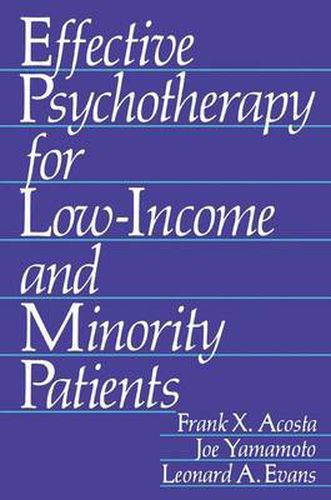Readings Newsletter
Become a Readings Member to make your shopping experience even easier.
Sign in or sign up for free!
You’re not far away from qualifying for FREE standard shipping within Australia
You’ve qualified for FREE standard shipping within Australia
The cart is loading…






This title is printed to order. This book may have been self-published. If so, we cannot guarantee the quality of the content. In the main most books will have gone through the editing process however some may not. We therefore suggest that you be aware of this before ordering this book. If in doubt check either the author or publisher’s details as we are unable to accept any returns unless they are faulty. Please contact us if you have any questions.
Psychotherapy involves a deep ethical commitment to self-knowl edge, personal change, and mutual respect by both the therapist and the patient. Unfortunately, therapists have not always lived up to that commitment in understanding and treating low income and minority patients. Too often they lack the skills to understand and adjust to the patient’s community and cultural experiences. The result has been ineffective and misguided treatment. Effective Psychotherapy for Low-Income and Minority Patients is a handbook for psychotherapists interested and committed to correct ing this situation and pursuing effective treatment strategies. This book is based on the author’s ongoing innovative research project at the University of Southern California School of Medicine’s Adult Psy chiatric Outpatient Clinic. Located in East Los Angeles, the clinic serves this nation’s largest Hispanic American community and has service commitments to residents of the central Los Angeles region. Over the years the authors have noted not only a marked need to improve mental health services, but also a need to make them more accessible to minority and low income patients. Generally these pa tients have very negative ideas about treatment of emotional prob lems. They typically react to treatment with skepticism: no one has really listened to them or understood them before-why should this therapist do so now? In describing this pessimism the authors discuss the need to listen to and respect each other.
$9.00 standard shipping within Australia
FREE standard shipping within Australia for orders over $100.00
Express & International shipping calculated at checkout
This title is printed to order. This book may have been self-published. If so, we cannot guarantee the quality of the content. In the main most books will have gone through the editing process however some may not. We therefore suggest that you be aware of this before ordering this book. If in doubt check either the author or publisher’s details as we are unable to accept any returns unless they are faulty. Please contact us if you have any questions.
Psychotherapy involves a deep ethical commitment to self-knowl edge, personal change, and mutual respect by both the therapist and the patient. Unfortunately, therapists have not always lived up to that commitment in understanding and treating low income and minority patients. Too often they lack the skills to understand and adjust to the patient’s community and cultural experiences. The result has been ineffective and misguided treatment. Effective Psychotherapy for Low-Income and Minority Patients is a handbook for psychotherapists interested and committed to correct ing this situation and pursuing effective treatment strategies. This book is based on the author’s ongoing innovative research project at the University of Southern California School of Medicine’s Adult Psy chiatric Outpatient Clinic. Located in East Los Angeles, the clinic serves this nation’s largest Hispanic American community and has service commitments to residents of the central Los Angeles region. Over the years the authors have noted not only a marked need to improve mental health services, but also a need to make them more accessible to minority and low income patients. Generally these pa tients have very negative ideas about treatment of emotional prob lems. They typically react to treatment with skepticism: no one has really listened to them or understood them before-why should this therapist do so now? In describing this pessimism the authors discuss the need to listen to and respect each other.